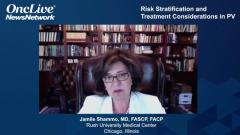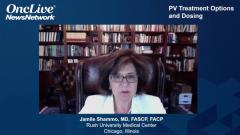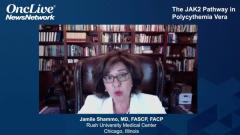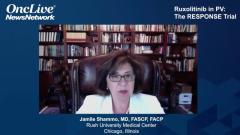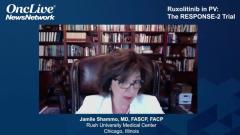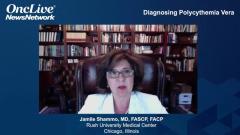
The JAK2 Pathway in Polycythemia Vera
A specialist in hematologic malignancies provides an overview of the JAK2 pathway as it relates to myeloproliferative neoplasms such as polycythemia vera.
Episodes in this series

Jamile Shammo, MD, FASCP, FACP: The JAK2 [Janus kinase 2] pathway is extremely important in normal hematopoiesis. The Janus kinase [JAK] enzymes are located on the inner surfaces of receptors in the hemopoietic stem cells. They are extremely important for hematopoiesis and erythropoiesis in particular. What happens is that when you have a cytokine that is linked to the receptor, the JAK2 enzyme becomes phosphorylated, and it transmits that particular signal into the nucleus via various pathways, JAK-STAT being one of them. That causes the increased proliferation and the generation of myeloid precursors.
If EPO [erythropoietin] binds to the receptor, then you end up with a generation of erythroid precursors. Ultimately, when you have a sufficient amount of erythroid precursors that are generated, then that inciting event that is hypoxia that led to the generation of erythropoietin turns off. Ultimately, that loop is turned off. However, when you have a mutant JAK2, this loop does not get inhibited. So this ongoing erythroid, erythropoiesis if you will, is constant. You can imagine the ongoing generation of myeloid precursors because of ongoing phosphorylation and activation of the JAK-STAT pathway with uncontrolled generation of myeloid precursors. That results in the generation of millions of blood elements flooding the circulation.
Why the mutant JAK2 isn’t inhibited isn’t exactly clear, but it is believed that because the mutation occurs in the autoinhibitory domain that perhaps results in the inability to inhibit that particular part of the enzyme or the molecule. Nevertheless, this is the pathological process that takes place in MPNs [myeloproliferative neoplasms] in general and obviously PV [polycythemia vera] in particular. It has also become one way for us to identify the disorder and make the diagnosis with 95% certainty.
TRANSCRIPT EDITED FOR CLARITY


